
A Man's Guide to Wearing Shorts
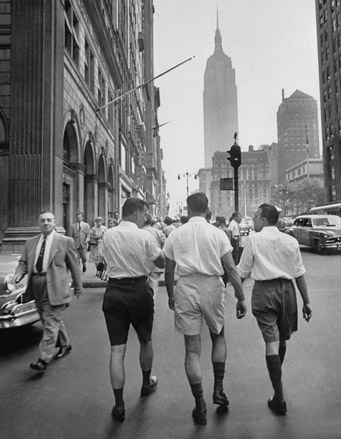
Few items in a man's wardrobe seem to elicit as much debate as shorts do. Today we'll uncover just why that is, and then offer some guidelines on the how, what, where, and why of wearing them. Guidelines I'm sure will be much debated! Let's get right to it.
Why are some men reluctant to wear shorts?
Why is there so much confusion about such a simple garment?
In the late 19th and early 20th centuries there were a number of English words for shortened men's pants. "Knickerbockers" were baggy pants that gathered below the knee, covering it. Shorter, tighter-fitting trousers that ended at the knee were "knee pants." "Short pants" sometimes meant knee-pants and sometimes meant shorter garments still.
All of these varieties were clothing for boys, both unofficially and as part of many school uniforms.
Grown men didn't start wearing shorts outside of extremely hot climates until after World War II, during which soldiers stationed in the tropics had been issued short trousers both for comfort and to ration cloth.
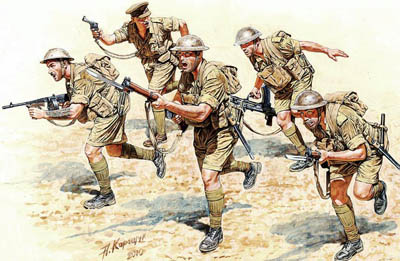
In the post-war years, shorts caught on as a specific uniform for some kinds of sports and recreation. They weren't fashion items or clothing that could be worn outside of a specific athletic activity — much the same way that a biker's spandex shorts and jersey wouldn't be worn off the bike path today. Tennis players might wear shorts on the court, but would clean up and change into trousers before socializing afterward.

In the middle of the 20th century, shorts were considered athletic-wear only. "Shorts" was more likely to refer to a man's boxer shorts, which he wore under his pants.
Shorts as a piece of comfortable, casual summer wear for men did not show up until the 1950s. Even then — championed by trendsetters in Hollywood and other men in the spotlight — the idea took a long time to catch on as "normal." There are still plenty of men alive today who remember shorts being basically clothing for young boys.
Shorts are a modern addition to a man's wardrobe and thus are still finding acceptance. Although common everywhere in North America, they are not common wear in many other parts of the world (to include hot climate countries).
Interestingly, while shorter trousers have gradually become acceptable in most arenas, athletic shorts went through a major shift from short, boxer-style shorts to longer mesh shorts in the 1980s. These days it's unusual to see the extremely short athletic shorts that end as soon as the hip turns into the thigh, though some runners do still wear them. For team sports, mid-thigh or longer has become the rule.
So shorts, at the end of the day, still have a boyish association. That's no longer a cultural expectation, and no one's going to think you've lost your mind if you wear them. Clothing manufacturers love the idea of being able to sell men even more pieces of clothing each season, and men love the cool comfort shorts provide, so that genie is unlikely to ever go back into the bottle. But it is still something we, particularly if you're an older man, instinctively think of as "boyish," even when we're not conscious of making that judgment.
When to Wear Shorts
Shorts are a casual piece of menswear. So when to wear them?
The simple answer is two-pronged:
1. When there's a good reason to (temperature, environment, location) and
2. When you're not conducting business or attending a formal ceremony/event
Recreation with family and friends is always a good default category for "shorts times." Beaches, private parties, outdoor sports and recreation, and anything else purely for fun and not in the company of strangers or business associates is definitely in the clear.
Even those situations, of course, need appropriate weather: wearing shorts when it's cold out is going to draw attention. Wear them when it's hot enough that you really want them, and switch to light trousers as soon as it's bearable.
In our modern world it also seems worth saying that a man who plans on leaving an air-conditioned house to get in an air-conditioned car and drive to an air-conditioned building can endure wearing trousers no matter what the weather is like. At the point where you have that much climate control you might as well wear the sharper-looking garment that better compliments your build.
FYI – The only people that can violate these rules are Californians. Please see Seinfeld.
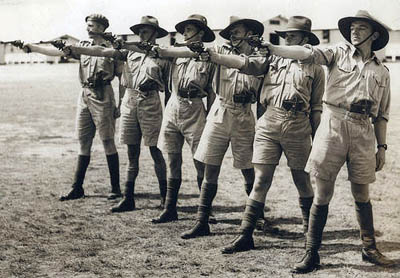
Target practice in Australia is a perfect occasion to wear shorts.
When to Skip the Shorts
Business dealings of any kind call for trousers. Even if it's just an informal game of golf, wear a pair of light trousers instead of shorts, regardless of whether other men are wearing shorts or not. Take a cue from the pros here (the exception being John Daly).
Any sort of structured event outside the immediate family and close friends is also a time to avoid shorts. Even casual luncheons, picnics, weddings, or other outdoor, summery sorts of events should merit light trousers if you'll be meeting strangers or relatively unfamiliar acquaintances.
Never wear shorts anywhere a jacket or blazer is expected. If the situation calls for that level of formality, it also calls for more formality than shorts offer. A few cultures have exceptions to this (shorts with blazers and ties are acceptable business wear in Bermuda, for example), but in most of the world it looks both out of place and a bit confused.
Finally, be aware of wearing shorts when traveling the world. In many countries it clearly marks you as a tourist and may draw unwanted attention.
How to Wear Shorts Well
As a lesser-worn piece of menswear, shorts prompt all kinds of questions: How long should they be? How baggy? How many pockets? Belt or no belt? And so on.
How Long Should Shorts Be?
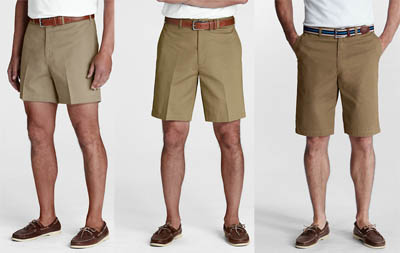
The far left pair are too short in my opinion. What do you think?
Short enough that your knees are visible or just slightly covered if standing still. Long enough that you're not showing the world you rarely tan your thighs; if I have to be specific, I would go more than 2-3 inches above the knee, depending on your proportions. Barron from the Effortless Gent backs me up here.
Anything past the knees has ceased to be "shorts." Those are high-cut pants, which is something else entirely (and not very flattering).
Shorts that do come up to mid-thigh should be limited to lightweight athletic shorts, and should only be worn in athletic settings. Running shorts get more leeway than casual shorts because the expectation is that you're not going to walk into a store or restaurant wearing them. Exercise devotees should bear this in mind, and should go home and change (and shower) before inflicting themselves on the public outside of gyms, courts, or bike paths.
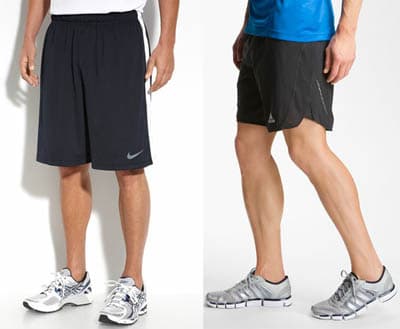
How Loose Should Shorts Be?
To some extent this is a matter of taste and style. Worth keeping in mind, however, is that shorts add bulk to the upper part of your legs only. Your lower legs will be bare, meaning that everything above them will look thicker by comparison. The baggier your shorts are, the thicker the look. So baggy shorts make your butt and thighs look big — not a look most men are seeking.
A close fit in the seat and straight legs down to the top of the knees looks good on most men. The style is reminiscent of military shorts, and their descendents, the Bermuda shorts, which are good classic styles that people have had a generation or two to get used to by now.
A baggier fit is sometimes common on the golf course, where it evokes the knickerbockers previously favored in the sport. These should obviously always be belted, preferably with a canvas and leather belt.
Pockets, Patterns, and Styles in Shorts
"Cargo shorts" or safari shorts with side, front, and back pockets are great for hiking or working outside anywhere that's hot but not particularly overgrown (or otherwise hazardous to bare legs). Outside of that, they don't have much of a role in your wardrobe. Let me be clear here: baggy, multi-pocketed shorts don't look great in social settings. These are ultra-casual and should not be worn to college social events.
Solid colors such as tan, khaki, white, navy, olive, and off-white are the most traditional styles for men's shorts. Plaids, especially plaids with a white base, are a preppy look staple, but should be paired with at least a polo shirt to avoid looking like a frat boy (and no collar pop, please). Madras pushes the prep look even further, and should be worn with caution.
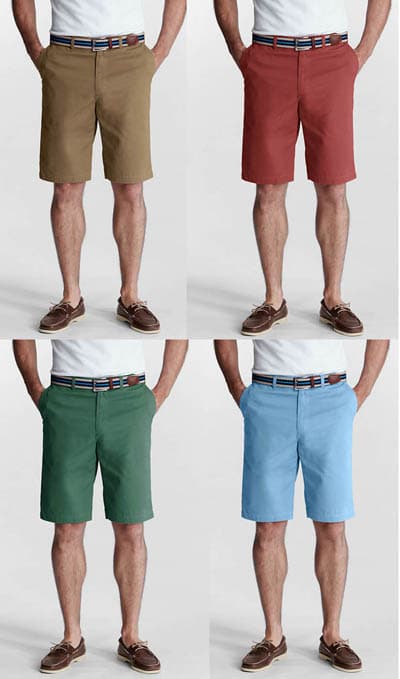
Notice how color affects the mood of the same pair of shorts. By introducing a brighter color you can take shorts from boring to eye-catching.
Louder-patterned shorts, the kind that look like Hawaiian shirts for your lower half, should be saved for beach vacations and Jimmy Buffet concerts. (Interestingly, these are often referred to as "Bermuda shorts," presumably because of the tropical association, but true Bermuda shorts are civilian versions of traditional military uniforms from the Pacific islands and are almost always khaki or white cotton).
What to Wear with Shorts
Can You Wear Socks with Shorts?
Can you? Yes. Should you? Only sometimes.
Socks and sandals is an appropriate pairing for old German men on vacation and no one else. So if you're wearing sandals, which is what you'd expect when it's hot enough to need shorts, skip the socks. And sandals are the most casual option: fine for beachwear, not OK for a graduation party.
Shorts worn with closed-toed shoes usually look best with ankle socks. Mid-calves are starting to cover almost as much skin as just wearing trousers would have, and if you're going to be that covered you might as well look better in trousers. Knee socks and shorts are downright laughable.
Slip-on casual shoes like boaters or loafers are also good companions to shorts, and don't require socks (though if you need them for comfort inside the shoe, most good shoe stores will have "ballet" or "invisible" socks that don't show above the shoe).
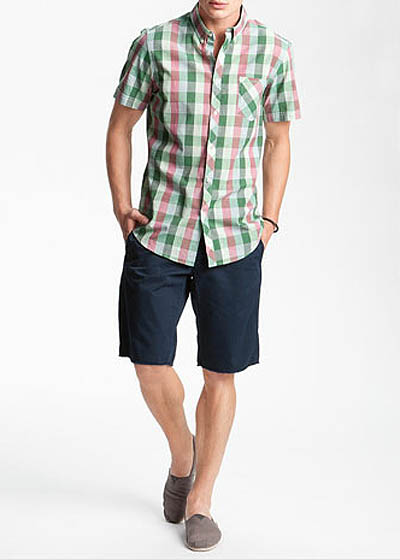
Shirts that Go with Shorts
Shorts are casual, so the shirt should be too. Don't wear a long-sleeved, button-fronted, collared shirt with shorts. Even with the sleeves rolled up it's too much of a stylistic mix-and-match.
Collared short-sleeve shirts are usually the best choice for men who want to look good but stay cool and casual. These can range from button-fronted (seersucker is particularly nice) to your basic monochrome polo shirt. Hawaiian shirts, like loud-print shorts, should be reserved for occasions where a little obnoxious tackiness is part of the fun — tiki bars yes, regular bars no, even near a beach.
T-shirts and shorts is a look that flatters no one. It may be appropriate in casual settings, but it's not going to make you look as good as other options.
Blazers or Jackets and Shorts
This is a very fashion-forward pairing. In a few parts of the world, most notably Bermuda and South Africa, shorts with business shirts and blazers is actually an established style, and tailors will happily make you a "suit" with short pants instead of trousers. Outside of those countries, however, it's very much a "fashion-forward" look.
If you're looking for more fashion-forward ways to wear shorts, visit Josh and Travis here.
Materials for Shorts
Before closing, it's worth noting a few of the cloth choices men have for shorts. These are garments meant for the most extreme heats of the year, so there's little point in wearing them if they're not made from something lightweight and breathable. Unfortunately, the most comfortable fabrics are often more expensive to produce, so a lot of mass-marketed shorts will be made with a thick cotton that's worse than wearing full trousers of a lighter, more breathable material.
Cotton Shorts
Cotton is a great menswear material for heat — if it's woven right. It's lightweight and breathable and is by far the easiest to wash and dry without special care. However, tight weaves of cotton hold hot air close to the body, and sweat or water evaporates from it very slowly.
- Seersucker is one of the lightest cotton weaves, with a dimpled surface that lets air flow. It's a joy to wear in the summer and one of the best options available.
- Madras (true Madras cloth, not just the reddish plaid print) has a very loose weave that lets air flow and dries quickly. There's very little domestic production in the United States, so it can be costly unless you happen to be in India.
- Gauze is more commonly associated with medical bandages, but the large weave with its visible square gaps was used for tropical military uniforms for some time and is reappearing in consumer clothes as well. It's another good option, though not as durable as Madras or seersucker.
- Drill or twill are both tighter weaves that hold in more air and moisture. Unfortunately, they're also cheap and common, and make up the majority of most commercial lines. Wear them when you need a bit more durability but aren't expecting to exert yourself too much.
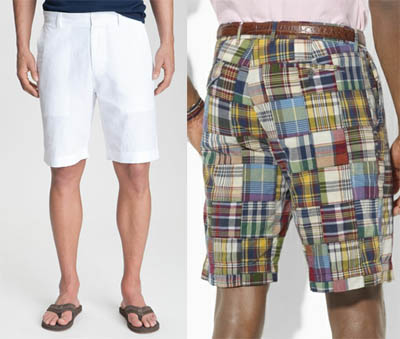
Linen Shorts
Linen trousers are more common than linen shorts, but if you can find a pair they're very lightweight and comfortable. Linen tends to wrinkle more than cotton, but the distinctive creases are part of the style, like the bumps in seersucker. Don't bother trying to smooth them out.
Wool Shorts
Tropical-weight wools are used for summer trousers because of wool's smooth drape, but that property is largely wasted in shorts. There's not a real reason to buy wool shorts, even ones made from very nice, lightweight wool.
Synthetics
Athletic shorts are usually made of synthetics like nylon or spandex. For the most part this is beneficial — the loose weave of basketball shorts keeps the artificial fibers from holding in heat and sweat, while newer synthetics can actually wick moisture away from the skin and let air flow even better than a cotton weave.
Want more? Then click on the image below to see Primer's visual guide to wearing shorts!
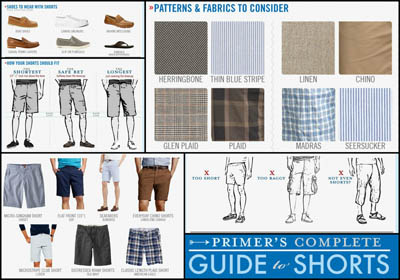
Also – don't forget AOM's guide to dressing in hot weather.
In Conclusion
Watch the video to have me talk you through the article.
Shorts are a modern classic piece of menswear with a storied history. They have a place in every man's wardrobe. Just make sure you wear them right!
Written By
Antonio Centeno
Founder of Real Men Real Style
Author of the Internet's Largest Style Video Library
No related posts.
















No comments:
Post a Comment